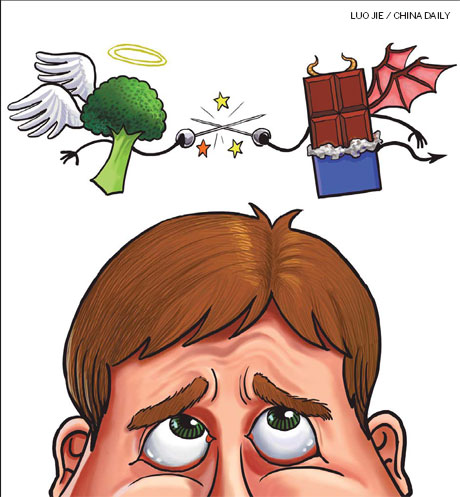Break bad habits before they break you
| ?
 |
All actions get wired into the brain over a period of time and that makes it very hard to effect a change, researchers say.
Uh-oh, the new year's just begun and already you're finding it hard to keep those resolutions to junk the junk food, get off the couch or kick smoking. There's a biological reason a lot of our bad habits are so hard to break ?they get wired into our brains. That's not an excuse to give up. Understanding how unhealthy behaviors become ingrained has scientists learning some tricks that may help good habits replace the bad.
"Why are bad habits stronger? You're fighting against the power of an immediate reward," says Dr Nora Volkow, director of the National Institute on Drug Abuse and an authority in the United States on the brain's pleasure pathway.
It's the fudge versus broccoli choice: Chocolate's yum factor tends to beat out the knowledge that sticking with veggies brings an eventual reward of lost pounds.
"We all as creatures are hard-wired that way, to give greater value to an immediate reward as opposed to something that's delayed," Volkow says.
Just how that bit of happiness turns into a habit involves a pleasure-sensing chemical named dopamine. It conditions the brain to want that reward again and again - reinforcing the connection each time - especially when it gets the right cue from your environment.
People tend to overestimate their ability to resist temptations around them, thus undermining attempts to shed bad habits, says experimental psychologist Loran Nordgren, an assistant professor at Northwestern University's Kellogg School of Management.
"People have this self-control hubris, this belief they can handle more than they can," says Nordgren, who studies the tug-of-war between willpower and temptation.
In one experiment, he measured whether heavy smokers could watch a film that romanticizes the habit - called Coffee and Cigarettes - without taking a puff.
Upping the ante, they'd be paid according to their level of temptation: Could they hold an unlit cigarette while watching? Keep the pack on the table? Or did they need to leave the pack in another room?
Smokers who had predicted they could resist a lot of temptation tended to hold the unlit cigarette - and were more likely to light up than those who knew better than to hang onto the pack, Nordgren says. He now is beginning to study how recovering drug addicts deal with real-world temptations.
But temptation can be more insidious than how close at hand the cigarettes are.
Always snack in front of your favorite TV show? A dopamine-rich part of the brain named the striatum memorizes rituals and routines that are linked to getting a particular reward, Volkow explains. Eventually, those environmental cues trigger the striatum to make some behaviors almost automatic.
Even scientists who recognize it can fall prey.
"I don't like popcorn. But every time I go to the cinema, I have to eat it," Volkow says. "It's fascinating."
Much of what scientists know about dopamine's role in habit formation comes from the study of alcohol and drug addiction, but it's a key player in more common habits, too, especially overeating.
In fact, for anything that links an action and a reward, "dopamine is indispensable for the formation of these habits", Volkow says.
A movement to pay people for behavior changes may exploit that connection, as some companies offer employees outright payments or insurance rebates for adopting better habits.
It's not clear yet just how well a financial incentive substitutes as a reward. In one experiment, paying smokers at General Electric up to $750 to kick the habit nearly tripled the number who did, says Dr Kevin Volpp, who directs the Center for Health Incentives at the University of Pennsylvania.
A similar study that dangled dollars for weight loss found no difference - and environmental temptation might help explain the differing results.
It's getting hard to smoke in public but "every time you walk down the street, there's lots of sources of high-calorie, tasty, low-cost food", Volpp says.
However paying for behavior plays out, researchers say there are some steps that may help counter your brain's hold on bad habits: Repeat, repeat, repeat the new behavior - the same routine at the same time of day.
Resolved to exercise? Doing it at the same time of the morning, rather than fitting it in haphazardly, makes the striatum recognize the habit so eventually, "if you don't do it, you feel awful", says Volkow, the neuroscientist who's also a passionate runner.
Exercise itself raises dopamine levels, so eventually your brain will get a feel-good hit even if your muscles protest.
Reward yourself with something you really desire, Volkow stresses.
You exercised all week? Stuck to your diet? Buy a book, a great pair of jeans, or try a fancy restaurant - safer perhaps than a box of cookies because the price inhibits the quantity.
Stress can reactivate the bad-habit circuitry. "You see people immediately eating in the airport when their flight is canceled," Volkow points out.
And cut out the rituals linked to your bad habits. No eating in front of the TV, ever. "What you want to be thinking about is, 'What is it in my environment that is triggering this behavior?'" Nordgren says. "You have to guard yourself against it."
Associated Press
(China Daily 01/05/2011 page19)























